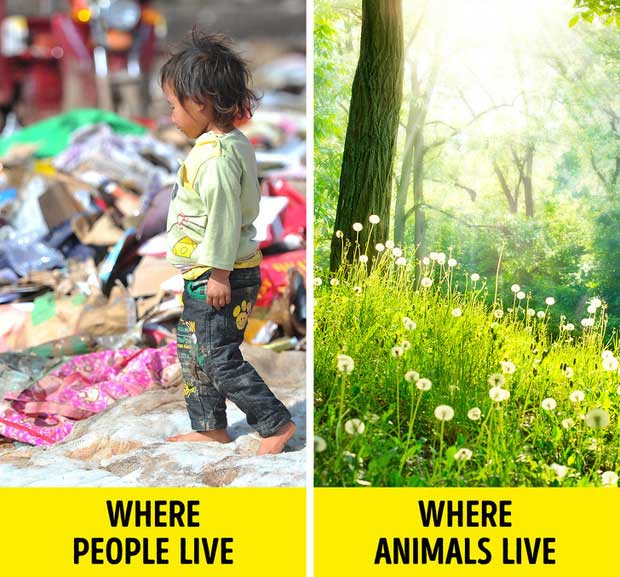The pictures show that people were too cruel to this world and cruel to themselves
A plastic bag can take up to 100, even thousands of years to decompose. An aluminum can is 80-200 years floating on the sea but seems to remain intact. And you know, a normal T-shirt, to make it also costs more than 5000 liters of water.
How are humans destroying the environment?
- 1. The impact of man on nature is enormous
- 2. Humanity has overused animals
- 3. The atmosphere is getting worse and worse
- 4. Greed in the deep sea
- 5. We abuse up to 175% of the Earth's endurance
- 6. Creatures are losing their home
Those are just small examples of just how much human impact on nature is. We have been too cruel to nature, to animals and to ourselves.
1. The impact of man on nature is enormous

Human waste is one of the most devastating factors. Because the decomposition rate is not fast enough, the garbage becomes clogged, causes flooding, and spreads the disease. Every day, we generate so much waste that in 2016, the world emitted 242 million tons of plastic waste alone.
This enormous number is not only dangerous to human health, but also exposes the animals in nature - especially marine life - to many risks. Several studies have shown that plastic (large pieces) can reach depths of up to 30 meters, and many marine species choke on accidentally swallowing them.
2. Humanity has overused animals
Although there were substitutes, every year humans still kill countless animals to get their fur for fashion. According to data of the International Humanitarian Association (HSI), there are hundreds of millions of creatures traded and exchanged for the purpose of fur, mainly weasels, foxes, bear dogs of North America .
3. The atmosphere is getting worse and worse

In many parts of the world, every day people breathe in an extremely polluted atmosphere, from the emissions of vehicles and industrial plants.
Industrial emissions are really dangerous to our health. According to data from the World Health Organization, emissions from cars are even likely to cause lung cancer.
The good news is that the world has become aware of this too. During the Global Health and Air Pollution Conference in 2018, many solutions were taken, including the conversion of fuel into clean energy sources.
4. Greed in the deep sea
A 2011 study in Plos One magazine showed that the use of trawling by humans has caused marine ecosystems to be extremely seriously affected. For those who do not know, the rake can be used in very deep water, sweeping an entire sea floor, without leaving anything behind. These nets can destroy fish nests, making it impossible for next generations of fish to breed. In other words, it is no different from annihilation.
Also in the course of development, mankind has allowed too much toxic chemicals to reach the ocean. Some experts said that toxic residues were found at depths up to 10,000m.
5. We abuse up to 175% of the Earth's endurance

Humans exploit the planet's resources for development. However, there is the fact that the rate of human exploitation is greater than the ability of the Earth to recover.
For example, in 2019, humans have used up all the resources that Earth can recover in a year on July 29. That is, from that point on, we are using what should have belonged to the next generation, and it will take 1.75 Earth to meet the needs.
6. Creatures are losing their home
The influence of mankind on the Earth is enormous, especially with wildlife.
As the Earth's temperature is rising, the Arctic ice melting faster at a rate of 11.3% per decade has greatly affected the white bear. The Arctic sea is now less ice, making the lives of white bears increasingly struggling. They cannot swim too far, their feeding range shrinks, and become wilted.
- The most cruel animals: kill your brothers and sisters as soon as they are born!
- 'Fine laughs' - Scary and painful torture in ancient times
- 7 most beautiful foxes in the world
- Funny animal kisses
- Pictures can also cause ... heart attack
- 10 most cruel lords of human history
- People of 100 years ago predicted the future: drawing aimlessly but becoming
- Looking at these pictures, can you guess which ones are not made by humans?
- Unbelievable but true story: the world is falling into a sand crisis
- The first stars were cruel but destitute
- Do not fool your photos in Germany if you don't want to be sued
- The world's most dangerous road
 Is the magnetic North Pole shift dangerous to humanity?
Is the magnetic North Pole shift dangerous to humanity? Washington legalizes the recycling of human bodies into fertilizer
Washington legalizes the recycling of human bodies into fertilizer Lightning stone - the mysterious guest
Lightning stone - the mysterious guest Stunned by the mysterious sunset, strange appearance
Stunned by the mysterious sunset, strange appearance